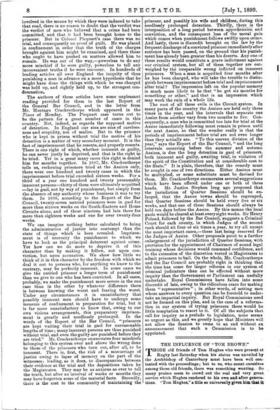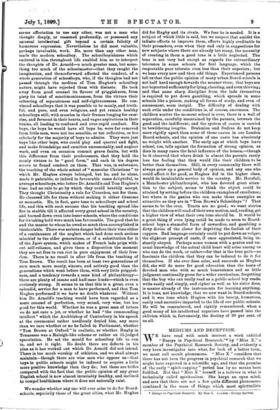THE INFLUENCE OF "TOM BROWN." T HOSE old friends of Tom
Hughes who were present at Rugby last Saturday when his statue was unveiled by the Archbishop of Canterbury must have been well con- tented with the proceedings; but to us, who count ourselves among those old friends, there was something wanting. So many praises seem to crowd out the real and very great service which Hughes rendered to his own and after genera. tions. "Tom Hughes," a title so universally given him tint it
seems affectation to use any other, was not a man who thought deeply, or reasoned profoundly, or possessed any unusual intellectual gift beyond a certain felicity of humorous expression. Nevertheless he did most valuable, perhaps invaluable, work. He, more than any other man, made the modern schoolboy. The schoolboyishness which endured in him throughout life enabled him so to interpret the thoughts of Dr. Arnold—a much greater man, but some- thing too much of the schoolmaster—that they caught the imagination, and thenceforward affected the conduct, of a whole generation of schoolboys, who, if the thoughts had not passed through the medium of Tom Hughes's schoolboy nature, might have rejected them with distaste. He took away from good counsel its flavour of priggishness, from piety its taint of sanctimoniousness, from the virtues their colouring of separateness and self-righteousness. He con- vinced schoolboys that it was possible to be manly, and truth- ful, and pure, and even religions, and yet remain healthy schoolboys still, with muscles in their frames longing for exer- cise, and ferment in their hearts, and vague aspirations in their brains, all leading to confused and over-rapid conduct. His boys, the boys he would have all boys be, were far removed from little men, were not too sensible, or too reflective, or too ol arly for the majority of boys to admire. They were just boys like other boys, who could play and quarrel and fight, and make friendships and enmities unreasonably, and neglect work, and even on occasion commit grave faults, but with this difference from their predecessors, that they held the manly virtues to be "good form," and each in his degree strove to found conduct on them. That was, in substance, the teaching of the whole school of "muscular Christians" to which Mr. Hughes always belonged, but he, and he alone, made it palatable, or indeed in favourable cases delightful, to average schoolboys,who before Dr. Arnold's and Tom Hughes's time had no rule to go by which they could heartily accept. They thought Christianity a rule for Churches, not for them. He cleansed life for them without making it either tiresome or monastic. He, in fact, gave tone to schoolboys and school life, and this with such success that his teaching spread like fire in stubble till it affected every great school in the country, and burned down even into lesser schools, where the conditions for its taking hold were much less favourable. The good that he and the master to whom he owed so much thus accomplished is incalculable. There was serious danger before their time either of a continuance of the neglect which had done such serious mischief to the older generations, or of a substitution for it of the Lye& system, which makes of French lads prigs with- out self-reliance, and gives them a disposition the moment they are set free to run riot in pure enjoyment of their free- dom. There is no recoil in after life from the teaching of Tom Brown. The result has been at least two generations of men much more manly, sincere, and actively good than the generations which went before them, with very little priggish- ness, and a tendency towards a sane kind of philanthropy— there are plenty of insane and half-sane kinds—which is even curiously strong. It seems to us that this is a great, even a splendid, service for a man to have performed, and that Tom Hughes performed it we have no doubt whatever. Without him Dr. Arnold's teaching would have been regarded as a mere counsel of perfection, very sound, very wise, but too good for this world. Whether he was a great man of letters we do not care a jot, or whether he had "the commanding intellect" which the Archbishop of Canterbury in his speech at the ceremonial rather needlessly denied him, any more than we care whether or no he failed in Parliament, whether "Tom Brown at Oxford" is realistic, of whether Rugby in Tennessee was a Raleigh-like scheme or rather an ill-judged speculation. He set the mould for schoolboy life to run in, and set it right. No doubt there are defects in his plan as it has worked out which Dr. Arnold did not intend. There is too much worship of athletics, and we shall always maintain—though there are wise men who oppose us—that boys in public 'schools might be induced to acquire a little more positive knowledge than they do; but these are trifles compared with the fact that the public opinion of any great English school is now almost invariably healthy, and inclined to compel healthiness where it does not naturally exist.
We wonder whether any one will ever arise to do for Board- schools, especially those of the great cities, what Mr. Hughes
did for Rugby and its rivals. We fear he is needed. It is a subject of which little is said, but we suspect that amidst the infinite efforts to improve them, efforts highly creditable to their promoters, even when they end only in suggestions for new subjects where there are already too many, the necessity of creating in them a good tone is a little neglected. The tone is not very bad except as regards the extraordinary tolerance in some schools for foul language, which the respectable poor tolerate even less than their superiors ; but we hear every now and then odd things. Experienced persons tell us that the public opinion of many urban Board-schools is not half hard enough towards the meaner vices; that boys are not boycotted sufficiently for lying, cheating, and even thieving; and that some sharp discipline from the lads themselves is required to put down gambling, which spreads in some schools like a poison, making all forms of study, and even of amusement, seem insipid. The difficulty of dealing with such evils under the conditions is, of course, enormous. The children scatter the moment school is over, there is a wall of separation, carefully maintained by the parents, between the good and the indifferent, and the system of castes is carried to bewildering lengths. Brahmins and Sndras do not keep more rigidly apart than some of these castes in our London Board-schools, and the opinion of one caste has absolutely no weight with another. The early age at which boys leave school, too, tells against the formation of strong opinion, as does in many cases the fatal influence of the homes,—though be it observed that where drink is absent the parents rarely lose the feeling that they would like their children to be better than themselves. Still, in every community there will always grow up a general body of opinion, and any one who could affect it for good, as Hughes did in the higher class, would do incalculable service to the country. Mr. Horsfall, a Manchester philanthropist, who has devoted great atten- tion to the subject, seems to think the object could be attained by setting before the children examples of excellence; but where is the genius who can make those examples as attractive as they are in "Tom Brown's Schooldays "? That seems to be the crux. Tracts are no good ; we want stories that the children will read of their own motion, and, reading, get a higher view of what their own tone should be. It would be a great thing if even lying could be made to seem to Board- school boys a shameful form of cowardice, and gambling a dirty device of the clever for depriving the foolish of their coppers. Bad language certainly could be put down as vulgar, the slightest precept of caste, if once appreciated, being in- stantly obeyed. Perhaps some woman with a genius and un- usual knowledge of the actual child heart will arise among us who can do the work, or rather—for that is the true path—so fascinate the children that they can be induced to do it for themselves. If she ever does arise, and succeeds as Hughes did, she will do more for good education than the hosts of devoted men who with so much benevolence and so little judgment continually press for a wider curriculum, forgetting that the boy who can really read as a public-school boy reads, write easily and simply, and cipher as well as his sister does, is master already of the instruments for learning anything. It is tone, not knowledge, that we now want in Board-schools, and it was tone which Hughes with his breezy, humorous, easily read narrative imparted to the life of our public schools. He will be remembered, and rightly remembered, when a good many of hie intellectual superiors have passed into the oblivion which is, fortunately, the destiny of 99 per cent. of us all.
















































 Previous page
Previous page